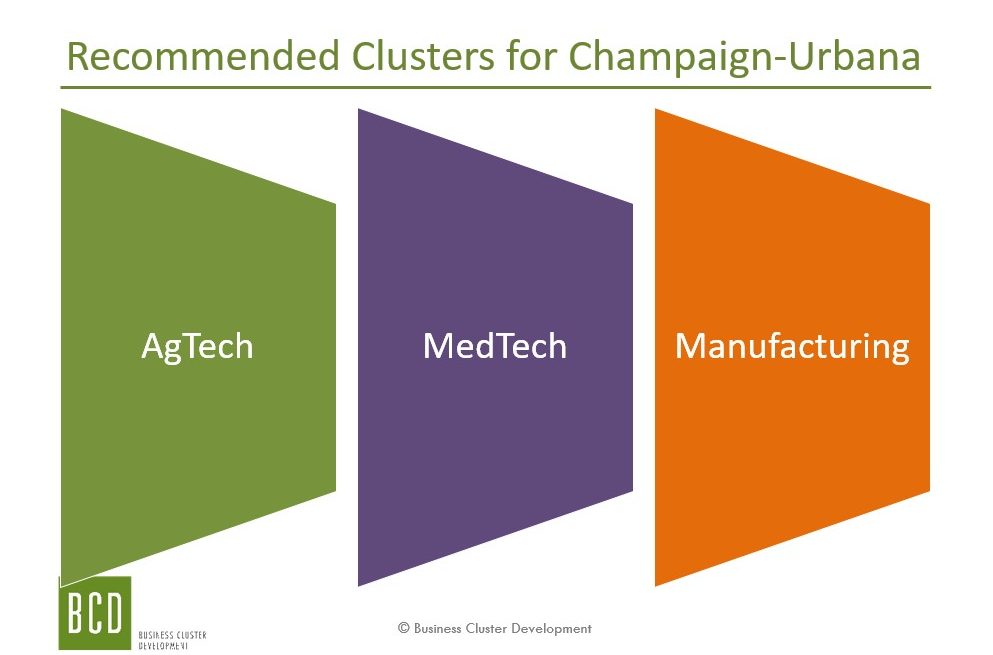Report Provides Suggestions for Next Steps to Maximize Impact of Future Investment & Community Collaboration
CHAMPAIGN, IL, February 10, 2021 – A recent study commissioned by the Champaign County Economic Development Corporation, University of Illinois Research Park, LLC and the University of Illinois Urbana-Champaign Office of Corporate Relations has identified three strong business clusters that provide a framework for where to focus the area’s economic development efforts.
Business Cluster Development, led by principal Carol Lauffer, completed more than 80 interviews with community, University, and business leaders in Champaign County to review the potential for growth and development of six industry clusters.
Following interviews and extensive research, Lauffer then identified three strong clusters deserving of further investment: AgTech, MedTech, and Manufacturing.
“Those of us who call Champaign-Urbana home know what a vibrant community we live in,” said Susan Martinis, Vice Chancellor for Research and Innovation at the University of Illinois at Urbana-Champaign. “As we deliberately plan for economic recovery and a post-pandemic future, this visionary report reflects a strong collaboration between the University and the broader community. Identifying AgTech, MedTech, and Manufacturing clusters brings together our respective strengths in innovation and positions us for exciting new opportunities.”

Underlying all of the sectors, Lauffer wrote, is the community’s strength in data science. The report affirms the three specific industry clusters in the region and provides an understanding of how those clusters may be leveraged as regional strengths.
AGTECH: AgTech combines UIUC’s technical expertise and talent in agriculture, engineering and data analytics with Champaign County as a prime growing region for corn and soybeans. Access to farmers as customers and farms as testbeds are important advantages for early-stage companies and the cluster.
MEDTECH: The emerging MedTech cluster in Champaign-Urbana capitalizes upon a relatively new and significant innovation asset, Carle Illinois College of Medicine; combined with UIUC engineering and bioscience expertise and research; and other healthcare innovation assets across the community, including the local hospitals and COVID-19 efforts.
MANUFACTURING: Manufacturing continues to be an important industry for Champaign- Urbana and an economic development priority. Generally, manufacturers in Champaign-Urbana make products that are non-standardized, have a more limited market size, or require customization. A number develop prototypes for entrepreneurs and businesses, including assistance with refining their product designs before scale-up.
Lauffer noted in the report that targeting and growing industry clusters is an economic development strategy designed to leverage the strengths present in a community in order to support new business formation, business retention and attraction, and grow the local economy.
“Research shows that when businesses from related industries locate in close proximity to one another they can increase their productivity and drive innovation,” said Carly McCrory-McKay, Executive Director of the Champaign County Economic Development Corporation. “This report not only identifies clusters, but provides strategies to help advance them. We are fortunate to be in a community that values collaboration. Together, we will continue to build our workforce and attract more capital into these clusters.”
This is the second time BCD has studied Champaign-Urbana. In 2014, the University of Illinois Urbana-Champaign commissioned Lauffer to assess and identify clusters that would capitalize upon its research strengths and expertise, and strengthen the local economy. That study contributed to the business case for the formation of the Carle Illinois College of Medicine.
About Business Cluster Development (BCD):
BCD, based in Palo Alto, CA, is a consulting firm focused on industry clusters or verticals. BCD provides guidance to operating incubators and accelerators and develops strategies that catalyze emerging innovation clusters. BCD evaluates entrepreneurial ecosystems and recommends paths to making them vibrant. BCD has consulted with clients for nearly 25 years and assisted with more than 80 programs across the U.S. and overseas. BCD’s clients are diverse, including cities, states, economic development organizations, universities, community colleges, research institutes, industry associations, non-profit organizations, real estate developers, and corporations. Learn more at http://clusterdevelopment.com/.
